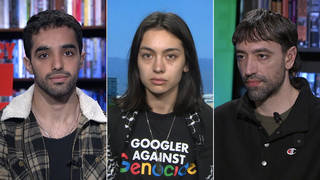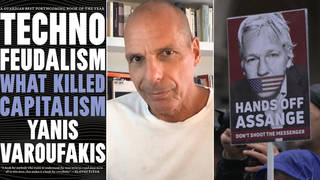
Related
Guests
- Wolfgang Kaleckgeneral secretary of the European Center for Constitutional and Human Rights and Edward Snowden’s European lawyer.
As Venezuela faces an attempted coup supported by the U.S., Brazil and the European Union, we speak with human rights attorney Wolfgang Kaleck. In November, John Bolton accused Venezuela, Cuba and Nicaragua of being part of a “troika of tyranny.” Kaleck says the real “troika of tyranny” is George W. Bush, Dick Cheney and Donald Rumsfeld, who should be in prison for war crimes. Kaleck is a human rights attorney who for decades has been at the forefront of the legal fight to hold powerful actors and governments around the world accountable for human rights abuses. His new book, titled “Law Versus Power: Our Global Fight for Human Rights,” documents his remarkable career, including his time as whistleblower Edward Snowden’s lawyer in Europe. Kaleck is general secretary of the European Center for Constitutional and Human Rights.
Transcript
AMY GOODMAN: This is Democracy Now! I’m Amy Goodman. We end today’s show with a human rights attorney who for more than two decades has been at the forefront of the legal fight to hold powerful actors and governments around the world accountable for human rights abuses. Wolfgang Kaleck’s work has taken him to Buenos Aires to stand with the mothers of young people disappeared under the Argentine military dictatorship; to exiled Syrian communities to make the case against torture mandated by those high up in the Assad government; to New York, where he took on Donald Rumsfeld, at the time the secretary of defense, for the torture he sanctioned after 9/11.
These stories are now collected in Kaleck’s new book, Law Versus Power: Our Global Fight for Human Rights, the book’s foreword written by NSA whistleblower Edward Snowden, whom Kaleck represents in Europe. Snowden writes, quote, “I came to appreciate that Wolfgang combines a lawyer’s attention to detail, a radical’s view of power, and an activist’s vision for a better world. … [W]hen the history of our era is written not by the torturers and their apologists, but by those who never gave up on the promise of the Universal Declaration of Human Rights—Wolfgang Kaleck will be one of the primary authors.”
Wolfgang Kaleck is the general secretary of the European Center for Constitutional and Human Rights—his new book, Law Versus Power: Our Global Fight for Human Rights—joining us now in our New York studio.
Wolfgang, it’s great to have you with us right here.
WOLFGANG KALECK: Good morning, Amy.
AMY GOODMAN: So, let’s start in Venezuela. We’ve just had two segments on what is unfolding, what looks like, well, an attempted or an actual coup d’état. Talk about it in the context of international law.
WOLFGANG KALECK: I mean, if a continent has a really well-established human rights mechanism, that’s Latin America. So, if there are accusations of human rights violations—and there are—in Venezuela, we have a court system with the Inter-American Court of Human Rights, which is not supported by the U.S., which is suffering from lack of money, from lack of resources, so the judges have to go around Europe and get funding for their court. I mean, if anyone is interested in democracy and human rights, they should support the Inter-American Court of Human Rights, first.
Second, I appreciate very much the remarks of the U.N. expert, de Zayas, who reminded us of the tragic history of U.S. military interventions in Latin America in the last decades and of the 2003 Iraq invasion, which is one of the causes why the world is in such bad shape right now.
AMY GOODMAN: Talk about the global state of human rights right now, as you see it. You generally live in Berlin. You are here visiting the United States.
WOLFGANG KALECK: Yeah, I mean, everybody’s talking now about Putin and Erdogan, Turkey’s president, and, of course, also about Trump, and rightly so. They have to be criticized on every level. No question about that. But we shouldn’t forget the former “troika of tyranny”: Bush, Rumsfeld and Cheney. And everybody tends now, in the light of, you know, the performances of President Trump, to think of these men as honorable, respectful politicians. They weren’t. They were war criminals. And the only reason why they are not in the prison is because the U.S. is so powerful and avoided any kind of accountability. And that is tragic.
And so, like de Zayas, I really think we have to remind what happened after 9/11/2001 here in this country, the serious breaches of international law. And that helped people like Erdogan, like the Chinese and others, to argue, “Why do you remind us of our human rights violation, when you have a prison like Guantánamo and when you’re invading Iraq without any legal justification?” And that is something which is really, really important to consider now.
And the other thing is, all these U.S. interventions, military interventions, all these military dictatorships led to really, really dramatic disasters on the level of these societies. Countries like Chile and Argentina have to struggle with their past until now, because torture is not something that happens at some point in the past. It has an impact on the individuals, on their families, but also on the society. And that is really, really important to bridge between the current situation and that past.
AMY GOODMAN: You mentioned Erdogan, the leader in Turkey, who called out what happened to Jamal Khashoggi in the Saudi Consulate in Turkey. Gina Haspel, the CIA director, went to Turkey, apparently heard video—heard audio of Jamal Khashoggi’s last gasps, the torture of Khashoggi. She comes back to United States, says, at the highest level, the CIA feels that the crown prince was involved in that murder. She’s not allowed to testify before the Senate the first time around. It’s Pompeo, and now Mattis is out. But they go testify, and said, “We really actually don’t know.” Gina Haspel, in a sense, is the one who blew the whistle on the torture and what happened. But you have known Gina Haspel in a very different way. And I was wondering if you can comment. McClatchy reported this month CIA Director Gina Haspel ran a secret agency black site for prisoners at Guantánamo. Your reaction to that news?
WOLFGANG KALECK: Yeah. First of all, finally, people talk about Saudi Arabia. I mean, Saudi Arabia is economically so powerful that nobody really dares to hold anyone in Saudi Arabia responsible for a human rights violation accountable. And it’s in a way—it’s a typical situation. I mean, we have this ongoing war in Yemen, thousands and thousands victims of the war, dozens and dozens of war crimes, and all supported by the Western states.
And so, one thing is, we appreciate very much that people are now talking about Saudi Arabia, because it gives us the opportunity to talk about the Yemen war. And there is one dimension of the Yemen war which is partly discussed in Europe, but only partly, and that is the arms trade with Saudi Arabia. And that is something—you know, one tends to point to the—and it’s a very tempting situation. Here you have the Saudi Arabian agents, you know, backed by the prince, who commit this brutal crime. So, you know, that’s awful. That is tragic. But one tends to forget the accomplices in the West. And that is the arms traders. And so, one of our—you know, I’m a lawyer, and I’m heading the ECCHR, European Center, in Berlin. And so, what we now want to do is to file cases against the arms traders as accomplices of these war crimes.
AMY GOODMAN: Often they are—we are not aware of that driving foreign policy, At least the media doesn’t stress it. But President Trump has brought it right out into the open. He says the reason we’re not going to do anything to Saudi Arabia about what happened to Khashoggi is because of our military relationship with them and the money they bring to the United States—whether or not that’s true.
WOLFGANG KALECK: Yeah, honest enough. I mean, let’s say others would cover themselves behind some kind of whatever reasons. And so, of course, this is the truth. So, even he talks sometimes the truth.
But coming back to Gina Haspel, Gina Haspel was part of the torture system after 9/11, which consisted of many different actions all over the world, not only Guantánamo, not only infamous prison Abu Ghraib in Iraq, but also the CIA extraordinary rendition program, a kidnapping and torture program of terror suspects. And so, as there is no kind of accountability here, no real investigation and prosecution in the U.S., we are trying, since 2004, to hold them accountable in Europe. And that’s the work we did, we carried out, together with the Center for Constitutional Rights in New York. And so, this brought me often to New York, because—there are options in Europe. We have several judgments of the highest court of Europe, the European Court of Human Rights, which declared the CIA extraordinary rendition program unlawful, in cases against Poland, against Lithuania, where there were secret detention sites, and in cases against Macedonia. And we also filed—we filed cases, criminal actions, against not only Rumsfeld, Bush, John Yoo, the lawyer who justified all this, who teaches now in Berkeley—a scandal—but also against Gina Haspel, because she was a very prominent figure in this system.
And so, the idea of all of these criminal actions is, if these people travel to Europe, we call upon the prosecutors and judges all over Europe to take care of them, to interrogate them, to eventually arrest them, and then to put them on trial. And I think people like Rumsfeld and Cheney are pretty much aware of that situation, like Henry Kissinger in the past. And they are, for that reason, not coming to Europe anymore.
AMY GOODMAN: And very quickly, President Obama’s approach to all of this, which was “Let’s look forward, let’s not look back”—
WOLFGANG KALECK: Yeah.
AMY GOODMAN: —in terms of whether or not these people will be held accountable. We have 15 seconds.
WOLFGANG KALECK: Unfortunately, very typical reaction. It’s stupid, because if we don’t care for the torture in the past, it will appear in the future again.
AMY GOODMAN: Well, we’re going to do Part 2 of our discussion, and we’re going to start by asking you about your client in Europe, Edward Snowden, who remains in political exile in Russia, the NSA whistleblower, and the importance of whistleblowers. Wolfgang Kaleck is general secretary of the European Center for Constitutional and Human Rights, author of the new book, Law Versus Power: Our Global Fight for Human Rights.
And that does it for our broadcast. Happy birthday to Charina Nadura!











Media Options